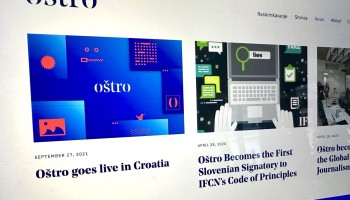Reported by
Online scammers are targeting Facebook users in Slovenia with emotionally manipulative posts and fake prize games to steal personal and banking information, according to an investigation by Slovenian media outlet Oštro.
The scheme involves fraudulent Facebook pages that pose as former employees of Big Bang, a Slovenian electronics retailer, claiming they are selling leftover items such as electric scooters or coffee machines at steep discounts. The pages often feature emotional stories to lure users into engaging with the content.
One example included a post stating: “I was fired from Big Bang after 10 years of work. They told me they no longer need me. I am still shaken by their behavior.” The message falsely claimed the poster was giving away products from a warehouse.
The Facebook pages then direct users to external websites that imitate brand-name surveys or prize games. These sites ask simple questions, such as a user’s favorite type of coffee, and lead to a virtual “prize wheel” that always appears to award a free gift. To claim the prize, users are asked to enter their name, address, and credit card details.
According to Slovenia’s national cyber security center, SI-CERT, this is a classic example of a hidden subscription scam, where victims believe they are making a one-time payment or paying for shipping, but are actually enrolled in recurring charges for services they never intended to purchase.
“Victims often do not receive the promised products, and their credit cards may be charged repeatedly,” SI-CERT told Oštro.
The investigation found that the domains linked to the scam websites were registered on the same day through the same American domain registrar, often using privacy protection services to hide ownership details. This suggests a coordinated scam operation.
The scammers also created fake Facebook profiles to support the scheme. One profile, under the name Nina Kovač, used a profile photo that Oštro traced to a Czech woman who had no connection to the scam. The account was created only days before the promotional posts appeared.
Oštro noted that these kinds of emotional manipulation techniques are becoming increasingly common in online fraud. By evoking sympathy and creating urgency, scammers increase the likelihood that users will act quickly and without caution.
SI-CERT reported that online fraud in Slovenia is on the rise, with over 2,700 cases recorded in 2023—more than double the number from the previous year. The agency emphasized the importance of verifying unfamiliar pages and avoiding entering personal or financial data on suspicious websites.
These scams are part of a broader wave of deceptive content that has spread across Meta platforms, including Facebook and Instagram, in recent years. Fake stores, misleading medical ads, and impersonation of public figures and media outlets have all been documented.
Meta has not responded to Oštro’s findings, and the fraudulent pages mentioned in the article had been removed by the time the investigation was published.
SI-CERT advises internet users to remain skeptical of offers that seem too good to be true and to report suspicious pages to Facebook administrators.






